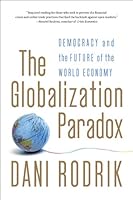
## Metadata
- Author: [[Dani Rodrik]]
- Full Title: The Globalization Paradox
- Category: #books
## Highlights
- The new consensus turned foreign trade and investment into the ultimate yardsticks for judging the adequacy of domestic economic and social policies—a key deformation produced by the quest for hyperglobalization. The best argument for addressing any domestic ill—whether crime, corruption, poor infrastructure, or low skills—was that it forestalled integration with the world economy.13 Just mention “foreign investor sentiment” or “competitiveness in world markets,” and policy makers would snap to attention. ([Location 2773](https://readwise.io/to_kindle?action=open&asin=B004H4X84K&location=2773))
- Telling poor countries in Africa or Latin America that they should set their sights on the institutions of the United States or Sweden is like telling them that the only way to develop is to become developed. This is hardly useful policy advice; ([Location 2870](https://readwise.io/to_kindle?action=open&asin=B004H4X84K&location=2870))
- The hedgehogs’ big idea this time was not trade; it had to be something else. But the reasoning took a similar form: “Poor countries are poor primarily because they lack X: give them X and we will have solved the problem of world poverty.” For the Peruvian economist and activist Hernando de Soto, X was formal titles to property. Give poor people a piece of paper which gives them legal ownership rights over their house or their land, he thought, and you will turn them into entrepreneurs and successful capitalists.27 For the Bangladeshi economist and banker Muhammad Yunus, X was credit. Give each entrepreneur a small loan (a “microcredit”), he argued, and you will unleash a process of growth and development from below.28 ([Location 2882](https://readwise.io/to_kindle?action=open&asin=B004H4X84K&location=2882))